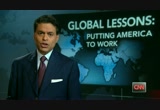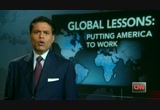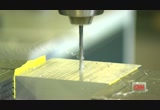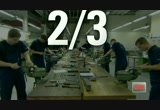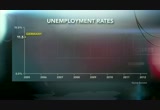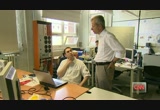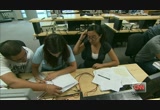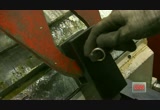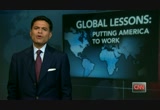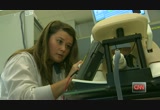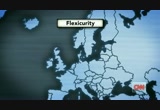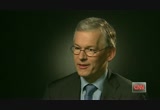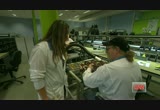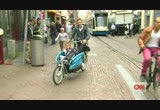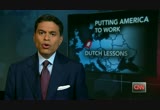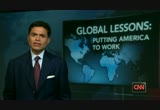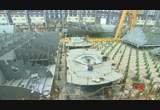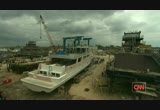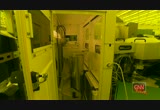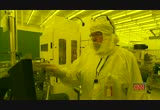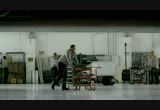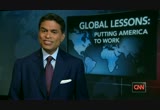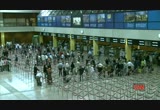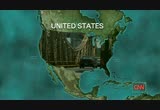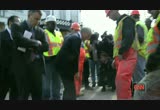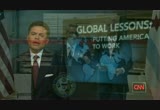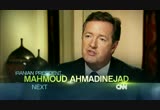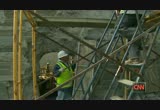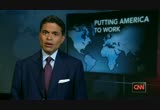tv America to Work CNN September 29, 2012 5:00pm-6:00pm PDT
5:00 pm
over the past two decades u.s. recoveries have been increasingly jobless no mat thor who has been in charge. the consultants at mckenzie point out that every recession from world war ii through the 1980s, it took us around six months to recover lost jobs, but after the 1990 recession, it took us 15 months to recover those jobs, and after the 2001 recession, it took 39 months. and after the 2008 downturn, mckenzie say s it will take 0wi month, five whole years to get backyears. the most plausible explanation is that the revolutions of information technology and globalization make it much easier for work to be done by machines or cheap labor are overseas. that may be great for companies and for capital, but it places tough pressures on the american
5:01 pm
worker. so what can be done? in this hour, we're going to offer you a global perspective on jobs, taking you around the world to look for solutions to our unemployment crisis. we'll visit europe, asia and the middle east. we'll also visit chicago where i spoke to president obama's former chief of staff now mayor rahm emanuel. he's trying a bold local experiment that washington refuses to try. but first, let's look at how to solve one of the most crucial aspects of the jobs crisis -- what to do about youth unemployment, which often turns into enduring adult unemployment. over 16% of americans under 25 are jobless. one country in europe may have a solution. let's get started.
5:02 pm
>> meet florian volts, just 23, just years out of high school. in the u.s. he'd have a 1 in 6 chance of being employed in the u.s. but he lives in germany where the youth unemployment rate is less than half of ours. one of the reasons for that, germany's apprentice system. volz has an apermit isship at simens. the company gives him over three years of paid training, a guaranteed job offer, plus vocational school. >> we know we can work afterwards here and have a job and a fixed job. siemens isn't the only company offering this speed deal. companies in almost every industry do the same, while the government provides a free
5:03 pm
vocational education. almost two-thirds of germany's young people take part in apprenticeships. >> it ranges from hair dresser training to, you know, running a nuclear power plant. >> siemens' peter thompson says his company is training around 10,000 apprentices in germany. there's a hefty price tag for each trainee, over $120,000. that's a major investment. >> it is. >> and you think you get a return on it. >> we know we do. >> other companies in germany do similar things. >> this is not forced upon us. we believe it's a good business model. and i think that germany's success as an exporting company is based on this skill. >> germany's success has been nothing short of remarkable a. once known as the sick man of europe, the company enacted reforms, cut costs and went through a painful period of restructuring. in 2005, unemployment peaked at
5:04 pm
over 11%, much higher than the eurozone and the united states. but the changes had made germany much more competitive. manufacturing exports started soaring and during the global recession unemployment actually went down in germany while everyone else's went up. germany's apprentice system, providing a wealth of high-skilled workers, had a lot to do with that success. apprentices at siemens get a crash-course in cutting-edge manufacturing and also work on their own projects. they can even get a bachelor's degree. >> i think there's a sense in the united states that this apprenticeship training is somehow a lid on a kid's career. it's quite the opposite. >> i already got my prototype working. >> when apprentices complete their training they get a certificate that's accepted throughout their industry so they can even work for another company if they want.
5:05 pm
but at siemens, over 85% end of staying after all that free training. >> that kind of investment, that kind of participation with the employee ends up in creatie ini loyalty. >> the linchpin of germany's apprentice system is collaboration. the companies, the vocational schools, the government and the traitd unions all work together to make sure that industry and its future workforce are compatible. >> it's almost like a triangle between government, private business and educational institutions. >> exactly. that's what makes it difficult to export to other countries. >> in the u.s., our patchwork system of job training programs is one of the reasons why we have 3.5 million job openings left unfilled. but near siemens' plant in charlotte, north carolina, the company has found a worthy partner. central piedmont community college has been running a program where students earn a degree and get trained by local
5:06 pm
manufactur manufacturers, just like in germany. >> it's not rocket science. germany has been doing this forever. >> pam house says their first apprentices will fill vacant positions at the plant as people retire. house faces a big challenge, though. convincing students that a four-year college degree isn't the only route to success. >> it was never a plan for me to be working in any type of industrial factory. so we need to loosen these. >> hope johnson was an honors student in high school. >> that's good. >> and says her parents really wanted her to attend a university. but as a math and science enthusiast, hope loved siemens' high-tech facility and her parents love the free tuition. >> you just focused on your frayeds and focus on what you're learning in the factory because they're paying for everything. >> now johnson is learning how to operate the machines that
5:07 pm
build siemens' massive generators. >> i talk to my friends. they're work at fast food restaurants. they're working at grocery stores. i work in a giant factory making stuff for power plants. it's like you can't beat that. >> but the big question is whether or not apprenticeship programs like siemens can be scaled up and offered all over the country. more companies will need to invest in training and attitudes towards blue collar work will need to change. >> in germany they're called the blue men because they wear blue overalls. they're very proud of being blue men. >> how do we achieve that cultural shift because in america that wouldn't quiting true. >> i think it was true. i thinit was. and i think these words "apprentice" and "journeyman "0 and "master" were in the english language for a long time.
5:08 pm
benjamin franklin came to boston to be an apprentice it's in our history. we just have 0 bring it back. >> if germany reminds us to return to our roots to find the next generation jobs, another country has a way to help the current workforce. its unemployment rate is only 5%. how do they do it? stay with us. [ male announcer ] citi turns 200 this year. in that time there've been some good days. and some difficult ones. but, through it all, we've persevered, supporting some of the biggest ideas in modern history. so why should our anniversary matter to you? because for 200 years, we've been helping ideas move from ambition to achievement. and the next great idea could be yours. ♪
5:09 pm
♪ playing a lone hand ♪ my life begins today ♪ ♪ fly by night away from here ♪ ♪ change my life again ♪ ♪ fly by night, goodbye my dear ♪ ♪ my ship isn't coming ♪ and i just can't pretend oww! ♪ [ male announcer ] careful, you're no longer invisible in a midsize sedan. the volkswagen passat. the 2012 motor trend car of the year. that's the power of german engineering. why not take a day to trend explore your own backyard? with two times the points on travel, you may find yourself asking why not, a lot. chase sapphire preferred. there's more to enjoy.
5:10 pm
i just served my mher-in-law your chicken noodle soup but she loved it so much... i told her it was homemade. everyone tells a little white lie now and then. but now she wants my recipe [ clears his throat ] [ softly ] she's right behind me isn't she? [ male announcer ] progresso. you gotta taste this soup.
5:11 pm
♪ so germany shows us how to get young people into an employment pipeline. but what about people who are already employed? how do we make sure they stay employed through the peaks and troughs of the national economy, through the highs and lows of their industry? for that, we travel to the netherlands which has one of the lowest unemployment rates in europe. what's their secret? it's something called flex security. come with me, and i'll explain. >> i started as a mechanic, then became tester and a troubleshooter. >> patricia vander vain works at royal phillips electronics. you probably know it similarly
5:12 pm
as philips, they make everything from simple light bulbs to high-tech medical equipment. she never went to college, but phillips has trained her to do three different jobs. her stint as a mechanic was on the assembly line. she was a coil tester. and now she's a troubleshooter for the mri machines that help scan patients' bodies in hospitals around the world. why? in the netherlands it's all about making sure people can stay employed in spite of any economic curveballs. >> it's not about same job of lifetime employment but it's about keeping people employable. >> university professor willtalken advised the european commission to help eu countries create more and better jobs. that earned him a unique nickname. >> people started calling me mr. nex security. whether this is a good or bad name depends.
5:13 pm
it's a debate. >> flexicurity was first coined in denmark and is controversial. it combines ideas from both side of the atlantic on one hand, the american flex bltd, the ability for owners to hire add fire with relative ease. on the other, traditional security net, make sure the employee is taken care of if they are fired or laid off. but in the wake of aw austerity, with unemployment soaring, some argue that the danish fairy tale lost its plot. so the netherlands does flexibility a little differently. a centerpiece of the dutch system is something called a mobility center, a partnership among companies that helps people find their next job instead of being let go. franz van houghton is the ceo of phillips, one of the largest employers in the leather lands. >> we also invest in their
5:14 pm
reemployability so the skills that phillips may no longer need could be very useful in other companies. will be made available. >> in america, an employer facing a downturn would simply lay off employees. in the netherlands, they are sent to the mobility center where a great effort is made to find them work with one of the other partner companies. it helps companies share risks in bad times while still actively maintaining a trained workforce that they can tap into in good times. >> everybody needs workers because it's an aging society. but they need the support of other companies. so it's like a joint interest. >> it also helps the bottom line, adds the professor. companies have a huge incentive to place the worker elsewhere. if they don't, they have to pay the employee's unemployment benefits for up to 38 months. >> working together with other
5:15 pm
companies in the mobility center, is it something that we do not have to carry on our own, but rather it becomes a job market. an the attractiveness of a job market is that it facilitas people, making demand and supply meet. that's what we all want. >> philips' ceo is leading an industry undergoing a major revolution. >> at this moment in london you see a may jour change from traditional lamps to led lighting. but it has as an unintended consequence changing our role at philips. >> to other jobs within the company. remember patricia whom you met earlier who's trained at three different jobs? if one goes away, she has skills for another. >> i think i'm in a better position in the job market now than a couple of years ago. >> and if that doesn't work,
5:16 pm
there's the mobility center. >> if you want to lay off somebody, it actually costs money and that money usually goes to the employee. in the mobility center, we invest some of the money that may have gone for compensating layoff in actually helping the employee find another position. >> it's a win-win for the company and for its employees. in some cases, companies like philips even temporarily pay the difference in people's salaries if they have to take lower-of p paying jobs. it is work transition and traichbing programs like these that have helped the netherlands' unemployment rate drop 60% since the 1980s. but the dutch have also taken the flexibility part of flexcicurity to the next dimension. half of the population, 77% of women and 25% of men, work part time so there are simply more
5:17 pm
jobs to go around. and people largely like the battle, says professor wilthaugen. >> most of them people don't want the full-time job. that is part of the dutch model. >> of course, these protections are so expensive that companies are also starting to rely more and more on temporary agency workers who enjoy most of the same rights as regular workers but can be dismissed more easily. and that, says wilthaugen, could lead to greater inkwablt. but overall, i adds, there's a reason netherlands has a less strained and more productive workforce if the world. >> it's not only corporate social responsibility but it's also self-interest. it's a small country. we want to be competitive so let's not waste the human capital, the talent that's here. let's try to keep it in our own region. >> the key lesson america can take from holland and germany is that companies are given incentives to invest in their
5:18 pm
workers so that, even when they do let them go, those workers retain skills and can be reemployed. up next -- should government be in the business of backing whole industries in order to create jobs? you know how to dance... with a deadline. and you...rent from national. because only national lets you choose any car in the aisle... and go. you can even take a full-size or above, and still pay the mid-size price. this is awesome. [ male announcer ] yes, it is, business pro. yes, it is. go national. go like a pro.
5:22 pm
young people into the workforce and how the netherlands keeps people there. but what about government supporting specific industries in order to create jobs? yes, i'm talking about industrial policy, a taboo subject in america. but government's support for industry is worth examining because it has created a lot of jobs for some of the world's fastest growing economies. it's a busy day at hyundai heavy industries ship building plant in south korea. over 10,000 workers at hyundai heavy churn out a massive new ship every three days. 40 years ago, this shipyard didn't even exist and south korea's ship building industry was tiny. but today this midsized nation of 50 million people is the number one ship builder in the
5:23 pm
world. with an industry that supports a huge number of jobs. >> today almost half of the world's commercial ships are made in south korea. >> michael lind, co-founder of the new america foundation, runs the think tank's program on economic growth. he points out that south korea's dictator inhe 1960s and '70s gave subsidies to develop heavy industries like steel, ship building and cars. the companies that were backed, hyundai, lg and samsung, are now household names. other asian countries like china and japan funded industry, too, often with impressive results. >> together they had 8% of global ship building in 1975, this year more than 90%. it is part of policy and subsidies by government, in particular. >> u.s. ship building once tried, says lind, thanks in part to subsidies.
5:24 pm
but in the 1980s, president reagan eliminated many of those subsi subsidies. how is the industry doing today? >> the united states has 0.5% of commercial seagoing ship building right now. >> of course industrial policy can be a losing strategy, too. >> the government is spending all this money favoring one industry over the other, and it's going to make lots of m mistakes. >> that's right in the sense that sometimes you get a massive allocation of resources. >> look at solyndra. they got a big loan from obama and went bankrupt, costing tax pairs $500 million. the government might be leery after the solyndeolyndra disast one state is getting to it in a different way. an initiative in albany has made noshlg a leader in nan 2340e
5:25 pm
technology. >> this will have significant implications for society. >> dr. allen cal yair oes, physicist, inventor and fully licensed nanogeek heads the college of nanoscale science and engineering, which is part ever the state university of new york. what is nanotechnology, anyway? >> the core of it is the know-how of how to manage individuals, at toms, and molecules. >> nanotechnology shows up everywhere in our lives from medicine to computer chips. state officials and the professor convinced over 300 nanotech companies to come to albany, creating 15,000 jobs across new york. >> the average of wage per one of those job sz $92,000. we're talking about $1.3 billion, $1.4 billion in wages alone going into the state economy. >> how did they do it? using an industrial policy of sorts but with a cav of yacht. >> not a single dollar goes to
5:26 pm
the companies. >> in the mid-1990s, the then governor offered a grant to the state of new york to create a nanotech research hub that companies could use. companies started giving money, too, because the cost of having their own research facilities was a huge expense. >> they can't afford doing it on their own so they love to partner with us. >> big names like ibm, intel and samsung all got into the mix, creating a massive center of innovation. new york state has given $1 billion to the college, but companies have given over $13 billion. >> we're not picking winners and lose losers. >> so you're not picking specific companies or specific adaptations of technology. you're creating a kind of open infrastructure which anybody can use. >> absolutely. >> the college has lifted albany's economy, giving many workers a second chance.
5:27 pm
john keefe was laid off from a paper manufacturer after working there for almost 23 years. he and some of his former co-workers were retrained by the college to work in the ultra sterile clean room where computer chips are made. putting on the required bunny suit felt odd at first, but keefe has gotten used to it. >> i'm very happy here. they take very good care of me. i'm hoping to retire from here. >> the next step is to apply the nanotech research hub model to other industries. the college received over $57 million from the department of energy to form a hub for america's solar companies. you think this is a much better model than the solyndra model of giving money to an individual company. >> absolutely. the white house, the federal government, have to look at how new york does things. you don't pick winners and losers. you focus on what the scientists
5:28 pm
5:29 pm
afternoon's overhaul starts with more pain. more pills. triple checking hydraulics. the evening brings more pain. so, back to more pills. almost done, when... hang on. stan's doctor recommended aleve. it can keep pain away all day with fewer pills than tylenol. this is rudy. who switched to aleve. and two pills for a day free of pain. ♪ [ female announcer ] and try aleve for relief from tough headaches. these are sandra's "homemade" yummy, scrumptious bars. hmm? i just wanted you to eat more fiber. chewy, oatie, gooeyness... and fraudulence. i'm in deep, babe. you certainly are. [ male announcer ] fiber one.
5:30 pm
5:31 pm
5:32 pm
america with tremendous potential for job growth, and it needs fewer regulations, not government money. the tourism industry. and few places do tourism better than dubai, one of the united arab emirates on the persian gulf. the world's tallest building, over half a mile high, mandmade islands shaped like a palm tree sprouding with luxury hotels. there's even an indoor ski slope in this desert oasis, conveniently located in a shopping mall. dubai stops at nothing to woo tourists. and when tourists come and spend their money, they're like walking job stimulus programs. >> they will create about a million yobs by the end of this decade just from travel and tourism. >> fritz van passion is the ceo of starwood hold and resorts, the company that owns weston and share ton and w hotel brands. he has 15 hotels in dubai, more
5:33 pm
than any other city in the world except new york. that's remarkable, considering dubai's small size, a little over 2 million people. >> 20 or 30 years ago, people didn't think of going there. now if you're in europe or especially if you're in russia, it's a place where people go. >> by 2020, hotel guests are predicted to triple and dubai aims to create 950,0 jobs fueled by tourism and related sectors. >> this idea that a small city state could create a million jobs in a decade? that's an enormous amount of growth. >> dubai's success in tourism comes at the perfect time because the industry is booming across the world. countries like china, brazil and india have rapidly growing middle classes that are keen to see the world. almost 18 million chinese are expected to travel outside their country this year according to the chinese government. that number is expected to be over 100 million in 2015.
5:34 pm
>> the opportunity in travel and tourism today is bigger than it ever was. >> but the u.s. has been missing out on that opportunity in a big way. after 9/11, america tightened its visa policies to improve security. partly as a result, the travel industry says, we have lost around one-third of our share of the international travel market. the good news is we can turn things around. how big could america's tourism industry be if we got all of these things right? because this the country everyone wants to come to. >> if the u.s. could just get back to its own share of international travel that it's lost in the last decade, that would amount to about 1.3 million jobs, which is roughly 20% of the total number of jobs that were lost in the entire crisis. that's a big number. >> so what can we learn from dubai to boost tourism here at home? lesson number one? make thoses easier to come
5:35 pm
by. dubai hands out visas to many foreign nationals right at the airport. we can't do that for every tourist, but we could naik easier to apply for visas. >> we have five people you can get visas in china. that's in a country where the there's 120 cities. >> the cost of more visa processing, says van passion, would easily be paid for by the increase of tourism business. lesson number two -- promote your tourist destination. promote it like there's no tomorrow. dubai has its own department of tourism, and the united arab emirates' marketing efforts have been ranked first by the world economic forum. washington has historically had little involvement in wooing tourists. ♪ land of dreams >> things are changing, slightly. the president and congress created "brand usa," a
5:36 pm
public/private entity that will promote america abroad. and the state department has improved visa processing and says that wait times are dropping. but, with greater ambition and the courage to do away with bureaucratic obstacles, this industry could grow mightily. >> the way i would describe it as a businessperson is, it's a good start, it's not mission accomplished. >> and there's one area where we're still way behind. lesson number three from dubai -- infrastructure. right now the airport for this tiny city state is one of the world's busiest, but apparently that wasn't enough because they're building a new airport that would be the busiest by far in the world, handling 120 million passengers a year. not bad for a place that was only a small fishing village a few decades ago. >> this is a lesson that the u.s. has taught the rest of the world. there probably wasn't a very good reason to go to vegas a
5:37 pm
couple of decades ago you can make the same argument about orlando. but u.s. business created those areas as a destination. ♪ where dreams come true created jobs, created an industry that the rest of the world took notice of and has done a wonderful job of copying in some areas. when we come back -- we'll return to the united states and show you an experiment in infrastructure that's turning heads and will create jobs in the windy city of chicago. stay with us. ♪ change my life again ♪ ♪ fly by night, goodbye my dear ♪ ♪ my ship isn't coming ♪ and i just can't pretend oww! ♪ [ male announcer ] careful, you're no longer invisible in a midsize sedan. the volkswagen passat. the 2012 motor trend car of the year. that's the power of german engineering.
5:38 pm
why not take a day to trend explore your own backyard? with two times the points on travel, you may find yourself asking why not, a lot. chase sapphire preferred. there's more to enjoy. nature valley trail mix bars are made with real ingredients you can see. like whole roasted nuts, chewy granola, and real fruit. nature valley trail mix bars. 100% natural. 100% delicious. when the doctor told me that i could smoke for the first week... i'm like...yeah, ok... little did i know that one week later i wasn't smoking. [ male announcer ] along with support, chantix is proven to help people quit smoking.
5:39 pm
it reduces the urge to smoke. some people had changes in behavior, thinking or mood, hostility, agitation, depressed mood and suicidal thoughts or actions while taking or after stopping chantix. if you notice any of these stop taking chantix and call your doctor right away. tell your doctor about any history of depression or other mental health problems, which could get worse while taking chantix. don't take chantix if you've had a serious allergic or skin reaction to it. if you develop these stop taking chantix and see your doctor right away as some can be life-threatening. if you have a history of heart or blood vessel problems, tell your doctor if you have new or worse symptoms. get medical help right away if you have symptoms of a heart attack. use caution when driving or operating machinery. common side effects include nausea, trouble sleeping and unusual dreams. it helps to have people around you... they say, you're much bigger than this. and you are. [ male announcer ] ask your doctor if chantix is right for you. and you are. greetings from the people here sure are friendly but some have had a hard time understanding my accent. so to make sure people get every word of the geico savings message i've been practicing how to talk like a true chicagoan.
5:40 pm
switching to geico could save you hundreds of dollars on car insurance... da bears. haha... you people sure do talk funny. geico®. fifteen minutes could save you fifteen percent or more on car insurance. trick question. i love everything about this country! including prilosec otc. you know one pill each morning treats your frequent heartburn so you can enjoy all this great land of ours has to offer like demolition derbies. and drive thru weddings. so if you're one of those people who gets heartburn and then treats day after day, block the acid with prilosec otc and don't get heartburn in the first place. [ male announcer ] one pill each morning. 24 hours. zero heartburn.
5:41 pm
hi there, i'm susan hendricks. here are your headlines. a fire in syria's largest city has reportedly destroyed hundreds of shops. activistses believe heavy fighting in aleppo overnight sparked the fire. an ancient covered market is in part of aleppo's oldest part of the city. they're fighting a decisive of battle for the city. the pope's former butler went on trial today in a vatican city courtroom off limits to tourists. he is accused of stealing secret papers from pope benedict xvi and leaking them to a journalist. they refused to strike some evidence. the butler faces a sentence of up to eight years if convicted. look at this. winds ripping through the
5:42 pm
japanese island of okinawa, this is all from typhoon jelawat. winds near the center of the storm are just over 100 miles per hour, similar to a cattlegoer 3 hurricane. 50 people suffer injuries while 270,000 homes have no power. the storm is expected to weaken as it moves north through colder waters. those are the headlines this hour. keeping you informed ee eed cnn most trusted name in news. now back to fareed zakaria. in 2002, the world economic forum ranked u.s. infrastructure fifth in the world. in its latest report, we're 25th. why? well, these days the rest of the developed world spends substantially more on infrastructure than we do. many emerging markets do even more. china spends 9% of its gdp on
5:43 pm
infrastructure to our 2.4%. our bridges are falling down. our power grid is antique. our water mains are bursting. and where are the great projects of the future? with borrowing costs lower than ever before in history, why can't we invest more and start putting people to work doing it? one man is on a mission to do just that, at least in his windy city. >> you can't have a 21st century economy sit ong a 20th century foundation. >> chicago mayor rahm emanuel, the notoriously sharp-witted. >> how dare you. >> dshg and sharp-tongued former chief of staff for president obama has a bold plan to rebuild his city. >> when i secured his agreement to come to work for my presidential campaign, neither one of us had gray hair. >> and he's getting help from an old friend. >> what you are doing here is
5:44 pm
the first in effect infrastructure bank using private capital that any city in the united states has established. this is a huge deal. >> the chicago infrastructure trust is mayor emanuel's plan to tap private investors to pay for big infrastructure projects that the government can no longer afford. the private investors would expect returns from project revenues, savings or fees. it's a model that's been successful all over the world, from the expansion of europe's largest port in rotterdam to the creation of the world's largest eco-city in china. >> this is a classic example of what works in the modern world. >> everywhere, that is, except america. until now. the chicago nonprofit trust intends to poor $7.2 billion into adding runways to o'hare,
5:45 pm
rebuilding crumbling roads, fixing aging schools, repairing dilapidated rail lines and much more. >> in the next three years we'll create 30,000ing jobs in the building trades areas engineers, carpenters, all going to work. >> five investment firms have expressed interest in being part of chicago's public/private trust. citigroup a sponsor of this program is among those who have expressed such interest. but no proposals have been put forth and no money has yet been invested by any of the potential private part fehrs. america used to have the best int inti infrastructu infrastructures. in the '50ss we were the envy of the world. >> when this country invested 4% of its gdp in infrastructure, our economy grew at 4%. not exactly a to a, but close.
5:46 pm
and when we scaled back our investments as a industry to 2%, our economy grew at that level. >> and with the government the investing less, emanuel is taking matters into his own hands. his first project? an energy retro fit of several public buildings, including the chicago cultural center, one of the city's largest energy consumers. >> this is what we call in the boiler world aarp. it's the senior citizen. >> exactly, right. it is. >> the retrofit will shave the city's energy bill by 25% over the next three years. >> these were put in in 1974. >> the city plans to take those utility bills savings, an estimated $20 million a year, and use that to pay back potential investors for the $225 million retrofit. in addition to increasing efficiency, emanuel says, he has
5:47 pm
to make up for a century of neglect. >> so this is 1885? >> just look at the water system. more than 3,800 water pipes broke in chicago in the last year alone, costing the city tens of millions of dollars. so he's repairing or replacing 900 miles of water pipe over the next decade. the city council voted overwhelmingly to pass the trust and will get approval on all proje projects. but critics question whether it's a smart move. they point to the bungled 75-year lease of the city's parking meters by the previous mayor in return for quick cash to cover the city's budget shortfall in 2008. >> there's a role for public private partnerships. selling an asset is the wrong way to go, in my view. >> whatever happens with emanuel's experiment, it's not just a chicago story.
5:48 pm
>> there's a lot of questions. i think the questions are very eager to understand how this is going to work. whatever happens, odds are a negative. the chicago lessons will absolutely hav a ripple effect across the country. >> the chicago infrastructure trust is perhaps a local version of the national infrastructure bank, an idea not even rahm emanuel could push through during his time at the white house. why did the national infrastructure bank idea not take off? >> because it got caught up in both the politics making sure the president doesn't have a win and also the politics of ideology. >> for his part, emanuel says we need jobs now and we need modern infrastructure for the long term. and he's done waiting for the gridlock to clear in washington or at the state capitol. >> the infrastructure trust allows us to actually start to unlock our future, take control of our destiny, and not leave it beholden to either the problem, the challenges of the
5:49 pm
dysfunction of either washington or springfield. >> infrastructure spending is the fastest way to create jobs, especially in the construction sector. the hardest hit by the recess n recession. an investment here lays the foundation for our economy to remain competitive for decades to come. up next -- my thoughts on putting america to work. so now i can be in the scene. advair is clinically proven to help significantly improve lung function. unlike most copd medications, advair contains both an anti-inflammatory and a long-acting bronchodilator working together to help improve your lung function all day. advair won't replace fast-acting inhalers for sudden symptoms and should not be used more than twice a day. people with copd taking advair may have a higher chance of pneumonia. advair may increase your risk of osteoporosis and some eye problems.
5:50 pm
tell your doctor if you have a heart condition or high blood pressure before taking advair. if you're still having difficulty breathing, ask your doctor if including advair could help improve your lung function. get your first full prescription free and save on refills at advaircopd.com. monarch of marketing analysis. with the ability to improve roi through seo all by cob. and you...rent from national. because only national lets you choose any car in the aisle... and go. you can even take a full-size or above, and still pay the mid-size price. i'm going b-i-g. [ male announcer ] good choice business pro. good choice. go national. go like a pro. your soups are so awesomely delicious my husband and i can't stop eating 'em! what's...that... on your head? can curlers! tomato basil, potato with bacon...
5:51 pm
we've got a lot of empty cans. [ male announcer ] progresso. you gotta taste this soup. i'm an expert on softball. and tea parties. i'll have more awkward conversations than i'm equipped for because i'm raising two girls on my own. i'll worry about the economy more than a few times before they're grown. but it's for them, so i've found a way. who matters most to you says the most about you. massmutual is owned by our policyholders so they matter most to us. massmutual. we'll help you get there.
5:53 pm
we've watched how countries around the world have created jobs with lessons for how we might do some of the same. but before we talk about the technicalities of training programs, boosting tourism and funding technology, there is a larger question that many americans wonder about. should the government do anything at all? should it just get out of the way? this debate is on display in the american presidential campaign. on the one hand, president obama has been making the case that the economy needs investments in
5:54 pm
infrastructure, education, training, science and technology. those investments in the president's telling are the key drives of american growth, jobs an industries. as we saw, that is certainly how the german and south korean governments have approached growth. >> it's wonderful to be with you. thank you! >> governor romney, on the other hand, argues that america needs tax and regulatory relief. the country is overburdened by mandates, taxes and rules that make it difficult for businesses to function, grow and prosper, he says. he wants to cut taxes, reduce regulations, and streamline government. and looking at places from switzerland to singapore to dubai, you can see that being friendly to businesses and to tourists can produce an economic bonanza. in some areas like infrastructure, most agree that the government must act and the need is urgent. if you defer maintenance on your
5:55 pm
house, the house deteriorates and eventually you actually have to pay more. that is what we are doing with our infrastructure. rather than fix it now when borrowing costs are at historic lows, we're passing a much bigger bill to our children. as i mentioned earlier, the world economic forum ranks us 25th in the world in infrastructure, down from 5th only a decade ago. education may be more complex. just spending money isn't the answer, but the problem is clear. in the 1970s america led the world in the number of college graduates. as of 2009, we're 14th among rich countries. and the jobs of the -- take federal funding for research and development, which is at half the share of gdp that it was in 1960 according to the national science foundation. industrial policy is more controversial, though historically there simply is no question that the u.s. government has provide ared
5:56 pm
massive support for industries like aircraft, semiconductors and the internet. fracking, by the way, was a technique pioneered with funding and help from the department of energy. let's be clear, though. governor romney has a strong case to make as well. that same world economic forum study that gave us poor marks for infrastructure gives us terrible marks on taxes and regulation. on the burden of government regulation category, the united states ranks 76th with a score of 3.3 on a total scale of 0 to 7. on the extent and effect of taxati taxation, the united states ranks 69th out of 144 countries. on total tax rate, percentage of profits, the united states take in 103rd out of 144. now, the truth is that, overall, the u.s. economy remains highly competitive. the world economic forum's report ranks the u.s. overall as the 7th most competitive in the
5:57 pm
world. that's why a few months ago the economist magazine predicted an american economic renaissance. where we have slipped badly of late is in our investmentse in people, science and infrastructure. so president obama's message is urgent and relevant. but why do we have to choose between these two views? we need tax and regulatory reform to make ourselves more competitive. america has to make itself attractive for investors, consumers and tourists alike. but we should also make the crucial investments we need for a 21st century economy. these two views look at the same challenge from different perspectives. governor romney is right to look at the world that companies operate in, with its challenges and opportunities. over the last 20 years, as communism collapsed and socialism has been discredited, countries around the world has become more business-friendly, lowering taxes and streamlining
5:58 pm
regulations. the u.s. has to stay competitor, over the long run, investment, industry, and jobs will move to other lands. president obama's view looks at the world from the perspective of an american worker. as more countries have joined the open global economy, these workers face intense competition from much cheap he labor. mckinzie estimates that between 1980 and 2010 the pool of work hes in the world expanded by 1.2 billion as chinese indian, ind it neegs and africans move from rural areas to cities. add to that the powerful effects of technology which make it easier to get work done with fewer workers. we live in exciting times of globalization and amazing technological revolutions. some, those at the top, large companies, will be able to ride through an exciting and
5:59 pm
expanding new landscape. but many americans will need help to better prepare themselves to compete in this brave new world. don't forget you can catch my regular show "gps" on sundays at 10:00 a.m. eastern and pacific in north america. thanks to all of you for tuning in. tonight -- my korld exclusive with one of the most controversial leaders in one of the most dangerous parts of of the world. if israel does launch a strike against your country, what will your response be? iranian president mahmoud ahmadinejad, sometimes combative -- >> some of the behavior of our united states in our region encourages extremism. >> surprising. >> how would you feel if one of your children dated a jew? >> and heated. especially when i asked him about basic human rights to gays. >> do you really beli
92 Views
Uploaded by TV Archive on

 Live Music Archive
Live Music Archive Librivox Free Audio
Librivox Free Audio Metropolitan Museum
Metropolitan Museum Cleveland Museum of Art
Cleveland Museum of Art Internet Arcade
Internet Arcade Console Living Room
Console Living Room Books to Borrow
Books to Borrow Open Library
Open Library TV News
TV News Understanding 9/11
Understanding 9/11